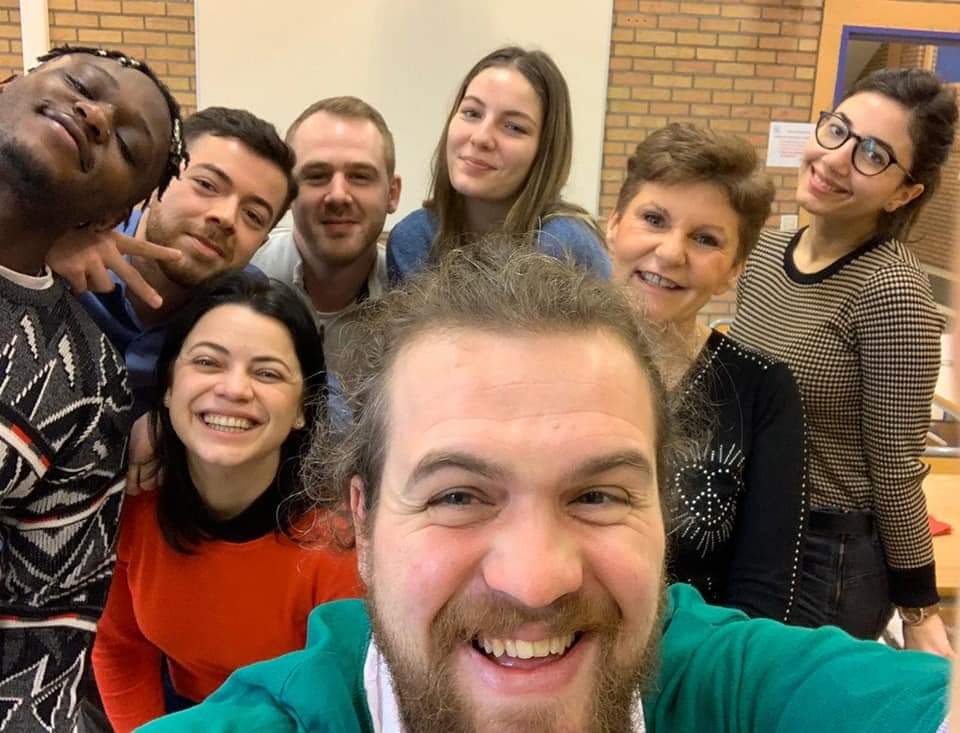ABOUT
What it means to speak only one language, Gregory does not know. Born in Brussels to an English mother and a Greek father, he has been a polyglot from an early age.
Gregory’s passion for languages is only matched by his love for music and the arts. This has lead him to develop a unique set of skills which give all his clients the competitive edge on the international business stage.
English Native
Nothing beats a native when it comes to understanding how to communicate with other natives, developing a natural flow or perfecting a British accent. Gregory’s clients are often impressed by his attention to detail and patience.
Speech Therapist
A qualified Speech Therapist, Gregory obtained his Master’s degree from the ULB-UCL in Brussels in 2012, specialising in the study of the human voice.
This has lead him to use a motor-learning based approach to teach his clients how to SPEAK English.
He believes many language classes fall short of their goals because they do not realise that the act of speaking is “too quick for grammar”.
He states that it’s impossible to access a grammar rule quickly enough while speaking without proper motor repetition. This is why he emphasises the necessity of a muscle-based approach.
His perspective is that speaking English is a procedural skill, similar to learning how to dance or play a musical instrument. This means that the key is to develop the right perception and coordination and train the body to react.
Sadly, most public speaking coaches do not understand the science behind a procedural skill like speech nor the specific intricacies of the English language. They work on public speaking aspects without addressing the underlying problems which are often linked to the act of speaking English itself.
Gregory aims to bring to his clients confidence in both their English and their speaking ability by explaining concepts and training his clients as if they were sports professionals.
Vocal Coach
In private and for the school “Music Action”, Gregory has worked with professional singers, amateurs and complete beginners and has always managed to strengthen their voices and heighten their pitch accuracy.
His background in music gives his clients the tools to improve the melody, rhythm and even charisma of their voice when they have to speak in public, pitch or lead a team.
Singer-Songwriter
Singing has always come naturally to Gregory. But this was not enough. To truly understand and reach his singing potential, he studied opera for 9 years at the Académie de Woluwé-Saint-Pierre and with private tutors to build a formidable tenor voice. He has also branched out into different music genres covering rap, rock or even metal.
This has made him understand what the sheer power of the human voice can do and how it can connect with a crowd to create magic while performing.
Gregory has never lost his voice and he credits good technique for this. He wants to use this same technique to bring an athletic voice to his clients so that they will never suffer of lack of breath or vocal strain again and so that they will feel confident when performing their speeches and pitches in front of large crowds.
As a songwriter, Gregory understands the importance of words when trying to communicate a message. He believes it is not just the melody of the voice, but the melody of the words themselves which is important and which leads to an impactful message.
With his clients, he uses singer-song writing techniques implemented by famous musicians to get number one hits to craft perfect sales pitches and presentations that “stick” in the mind of people and make the sale.
Theatrical Improvisation Performer
Emotions, story-telling, adrenaline, creating magic out of thin air…that’s what has animated Gregory’s love of theatrical improvisation. And has led him to dedicating seven years of his life in this pursuit. Gregory aims to bring some of this magic to his clients’ speeches, presentations and pitches by using age old stagecraft techniques to always know what to say and have a creative response to any situation.
Gregory insists that most things worth living in life are unscripted. Many people try to stick to a learned script and this leads to them sounding wooden or unnatural.
This is why it is paramount to understand and feel at ease with the act of improvisation to become a confident speaker. Gregory’s clients are often amazed at how much of a relief it can be to “live in the present moment” and not have to stick to the script when talking in public.
And the great thing with working on improvising is that it’s a whole lot of fun!
English Teacher
With over fifteen years of experience, Gregory has taught people of all ages and backgrounds across both the private and public sectors, always finding that anyone can improve with the right method.
His teaching journey began at My Sherpa, where he coached children and teenagers while still at university. He then moved into secondary education at Notre-Dame-Des-Champs and Institut-Saint-André, where he coached the public speaking team, leading several students to the quarter-finals.
Subsequently, he developed a practical, results-oriented approach that he used while teaching travel agents for the EFPME, focusing on role-play and presentations. He also brought his expertise and further developed this method working for ATOLO, where he trained IT teams.
For the past several years, Gregory has been dedicated to teaching adults at the Promotion Sociale in Auderghem https://iaps.be/intermediate-english/?lang=en , a school which welcomes people from across the world and of any age. To this day, he continues to inspire and guide his students toward achieving their language goals.
He believes it’s never too late to apply what works and proves this time and time again with his students’ and clients’ results.
He is also recently been a guest on the podcast “What’s your story” podcast where he explains his journey https://whatsyourstory.be/root/fr/gregory-vettas-collins-gvc-anglais-strategique-hrmeetup-505





TESTIMONIALS
MY COACHING METHOD
-

Identify
First, we identify your unique sticking points and limiting beliefs and find the expressions you are likely to utter in specific work or public speaking situations.
-

Script
Next, we script out the situations you need and focus on pronouncing the required words and expressions in a safe and controlled environment.
-

Flow
The last step? Make it flow! Once we’ve trained the necessary vocabulary and expressions, it’s time to bring them into your everyday speaking.





